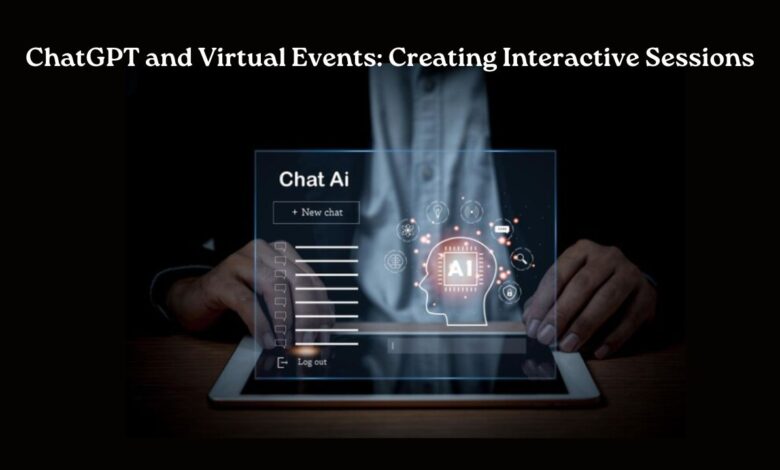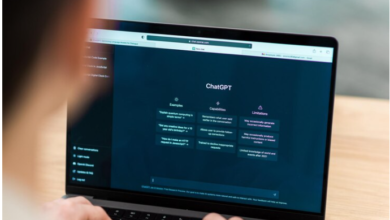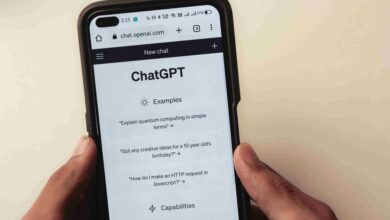ChatGPT and Virtual Events: Creating Interactive Sessions

ChatGPT, developed by OpenAI, is a groundbreaking natural language processing (NLP) model with significant applications for virtual events. In today’s digital landscape, where engagement and interactivity are crucial, integrating ChatGPT introduces a new level of responsiveness.
ChatGPT, based on a transformer architecture, excels in understanding and generating human-like text. It enhances virtual events by facilitating dynamic interactions with attendees and delivering personalized content in real-time. This integration redefines interactive sessions, enabling activities like live Q&A sessions, interactive storytelling, and collaborative problem-solving.
Key benefits of incorporating ChatGPT into virtual events include enhanced engagement, personalized interactions, real-time responsiveness, scalability, accessibility across diverse demographics, and valuable data insights for optimizing event content and engagement strategies.
Designing Interactive Formats with ChatGPT
Incorporating ChatGPT into virtual events opens up engaging possibilities to captivate attendees. Here’s a look at various interactive sessions feasible with ChatGPT:
1. Live Q&A Sessions:
Participants can ask questions naturally, and ChatGPT provides real-time responses based on the discussion context.
2. Polls and Surveys:
Conduct instant polls or surveys using ChatGPT to gather feedback and insights from attendees.
3. Collaborative Brainstorming:
Facilitate idea generation sessions where ChatGPT assists in organizing and refining participant contributions.
4. Interactive Workshops:
Guide participants through interactive workshops, offering step-by-step instructions and personalized feedback.
Key Features for Structuring Q&A Sessions:
1. Preparation Phase:
Prime ChatGPT with relevant information and FAQs to ensure accurate responses during the session.
2. Real-time Interaction:
Enable attendees to ask questions in chat interfaces with ChatGPT providing instant answers or routing complex queries to human moderators.
3. Personalized Responses:
Tailor responses based on attendee profiles or previous interactions for personalized answers and recommendations.
4. Handling Multiple Queries:
ChatGPT’s multitasking capability allows for efficient management of multiple queries simultaneously.
Implementing Interactive Storytelling or Role-playing Activities:
1. Storytelling Sessions:
Co-create stories by interacting with characters or scenarios generated by ChatGPT.
2. Role-playing Exercises:
Use ChatGPT as a virtual guide, responding to participants’ actions and decisions.
3. Scenario-based Simulations:
Design immersive simulations where participants navigate challenges with ChatGPT’s assistance.
4. Interactive Games:
Incorporate text-based games, quizzes, or puzzles to the event to create an entertaining and captivating element.
Enhancing Audience Engagement with ChatGPT:
Using ChatGPT offers innovative ways to personalize experiences, implement gamification, and integrate interactive elements like polls, quizzes, and surveys to boost attendee engagement in virtual events.
1. Personalizing Attendee Experiences:
ChatGPT analyzes attendee preferences and interactions to provide customized recommendations, engages in tailored conversations based on attendee profiles, interests, or previous interactions, and adapts content delivery in real-time to align with participant needs and expectations.
2. Implementing Gamification Strategies:
Gamification is enhanced with ChatGPT by designing interactive challenges and puzzles, tracking participant progress, awarding points and personalized feedback, and integrating ChatGPT into virtual simulations and role-playing activities for immersive gameplay experiences.
3. Integrating ChatGPT into Polls, Quizzes, or Surveys:
ChatGPT elevates the interactivity of polls, quizzes, and surveys by allowing natural language interactions, providing real-time feedback and explanations for quiz responses, and handling complex survey questions or analyzing open-ended responses to generate insightful data for event organizers.
Technical Integration
Incorporating ChatGPT into virtual events requires thoughtful consideration of compatible tools, API integration for interactive sessions, and customization to meet specific event requirements. Let’s delve deeper into each aspect of technical integration with ChatGPT:
1. Tools and Platforms Compatible with ChatGPT for Virtual Events:
ChatGPT can be seamlessly integrated into various tools and platforms commonly used for virtual events, including:
- Virtual Event Platforms: Major virtual event platforms like Zoom, Webex, or Hopin can leverage ChatGPT for enhancing attendee interactions, Q&A sessions, or personalized experiences.
- Chat Interfaces: ChatGPT can integrate with chatbot platforms such as Slack, Microsoft Teams, or Discord to facilitate natural language interactions and automate responses during virtual events.
- Custom Event Apps: Developers can embed ChatGPT into custom event apps to provide attendees with AI-powered features like personalized recommendations, interactive sessions, or real-time assistance.
2. API Integration and Setup for Interactive Sessions:
API integration is key to leveraging ChatGPT for interactive sessions within virtual events:
- OpenAI API: Utilizing OpenAI’s API, developers can integrate ChatGPT into virtual event environments to handle text-based interactions, manage conversation flow, and generate responses.
- Webhooks and Callbacks: Setting up webhooks and callbacks allows event platforms to communicate with ChatGPT’s API in real-time, enabling dynamic content generation and personalized interactions.
- Session Management: Implementing API calls to manage session states, handle user inputs, and orchestrate ChatGPT’s responses ensures a smooth and responsive interactive experience for attendees.
Customizing ChatGPT for Specific Event Needs:
Customization of ChatGPT is essential for adapting the AI model to meet specific event requirements:
1. Training with Industry-specific Data:
Fine-tuning ChatGPT using industry-specific datasets enables the AI to understand and generate contextually relevant responses using specialized terminology or jargon.
2. Contextual Understanding:
Incorporating event-specific context and information into ChatGPT’s training data enhances its ability to provide accurate and meaningful interactions during the event.
3. Persona Development:
Developing a custom persona for ChatGPT aligns its responses with the event’s tone, style, and audience demographics, creating a cohesive and engaging experience.
Best Practices for Moderation and Control in Virtual Events with ChatGPT
In virtual events using ChatGPT, moderation and control are crucial for ensuring a positive attendee experience. Implementing best practices involves:
1. Real-time Monitoring:
Assigning moderators to oversee ChatGPT interactions, promptly addressing any inappropriate or off-topic conversations.
2. Establishing Response Guidelines:
Defining clear guidelines to ensure ChatGPT responses are accurate, relevant, and professional.
3. Human Oversight:
Integrating ChatGPT with human moderation to handle complex queries or sensitive topics beyond AI capabilities.
Setting Guidelines for Audience Interactions:
1. Educational Outreach:
Providing attendees with guidelines on language, topics, and behavior when interacting with ChatGPT.
2. Encouraging Respectful Engagement:
Promoting inclusive interactions to foster a positive virtual event community.
3. Clarifying Expectations:
Communicating purpose and limitations of ChatGPT interactions to manage attendee expectations effectively.
Addressing Privacy and Ethical Considerations:
1. Data Security:
Protecting attendee data collected during ChatGPT interactions and ensuring compliance with data protection regulations.
2. Transparency:
Informing attendees when they interact with AI instead of human moderators.
3. Ethical AI Practices:
Upholding principles of fairness, transparency, and accountability in deploying ChatGPT for virtual events.
Case Studies and Examples
1. Optimizing Event Registrations and Attendee Experience:
AI chatbots like ChatGPT simplifies event sign-up through customized interactions and on-the-spot aid. Attendees can get their queries answered promptly, leading to a smoother registration experience. Through natural language understanding, ChatGPT comprehends nuances and context, making interactions feel remarkably natural and engaging. Attendees receive personalized information about the event, schedules, and logistics, enhancing their overall experience.
2. Real-Time Assistance and Customer Support:
During virtual events, ChatGPT acts as a responsive customer support agent. It answers questions, troubleshoots technical issues, and guides participants seamlessly. Attendees can seek assistance without delays, ensuring a positive event experience.
3. Event Gamification and Engagement:
ChatGPT can introduce gamification elements to keep attendees engaged. It suggests interactive challenges, quizzes, or polls, making the event more exciting. By fostering engagement, ChatGPT enhances participation and creates memorable experiences.
4. Content Recommendations and Personalization:
ChatGPT suggests appropriate sessions, workshops, or networking events based on attendee preferences and interactions. Attendees receive tailored content, maximizing their value from the event.
5. Automated Event Reminders and Updates:
ChatGPT sends automated reminders about upcoming sessions, networking breaks, and important announcements. Attendees stay informed without manual effort, ensuring they don’t miss out on valuable content.
6. Post-Event Surveys and Feedback Collection:
After the event, ChatGPT can collect feedback through surveys. Event participants voice out their views on sessions, speakers, and their overall level of satisfaction. Organizers gain insights for future improvements.
7. Multilingual Support:
ChatGPT’s language capabilities allow it to assist attendees in various languages, making events accessible to a global audience.
Conclusion:
Integrating ChatGPT into virtual events represents a transformative approach to enhancing engagement, interactivity, and personalization. By leveraging ChatGPT’s capabilities to facilitate dynamic interactions, deliver personalized content, and implement innovative formats like interactive storytelling and gamification, event organizers can create memorable and impactful experiences for attendees. Additionally, adopting best practices for moderation, privacy, and ethical AI usage ensures a positive and responsible environment. With ChatGPT, virtual events can achieve enhanced engagement, scalability, and valuable data insights, ultimately optimizing the event experience and paving the way for future advancements in AI-driven event technology.
Explore www.intogeeks.com for more topics relevant to ChatGPT.




